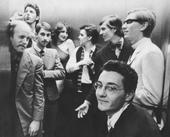Formed by Liverpool art students, they got their name from a place where they rehearsed. Winning a talent contest led to a recording contract, and the band layed down the best pop album of 1976 with Second Honeymoon. The sound was a concoction of modernized Tin Pan Alley, theatrical inner-war melodrama and raunchy post-Glam camp. Cadillac took a lions share of the vocals with his debonair prowess, but the sultry crooning of Bette Bright always had you wanting more. Then there were the songs. Clive Langer demonstrated himself to be one of modern pop music's greatest composers with an enormous knack for melody, whilst Steve Lindsey helped out quite well also.
The bands brief flurry of press in the U.K. was derailed by the onslaught of Punk, but the band was undeterred. Their sophomore effort, Don't Stop The World, was equally compelling, with a notable mix of Euro cabaret and Punk in the title track. Their next album, English Boys, Working Girls, showed them almost fully transformation into a New Wave band, but with a rich wall-of-sound and a grip on dynamics that others in that vein could only dream of. Soon after, the band was no more, but members quickly fell into other Liverpool New Wave acts. Clive Langer became a highly successful producer, helping shape the sound of Madness and Dexy's Midnight Runners, among others.
